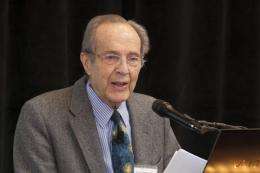Energy efficiency paves way to a low-carbon future, but barriers persist

Former Secretary of Defense William Perry, now a Stanford University professor emeritus of management science and engineering, lists biomass, plug-in hybrid cars, nuclear power, more natural gas and energy efficiency as the only potential near-term answers to easing the United States' emissions of greenhouse gases and addiction to oil.
Of these items, what is the most important?
"I would put energy efficiency as No. 1 on my list," Perry said recently at a Stanford conference. "We should redouble our efforts." Biomass and hybrid cars are still developing, he said, and nuclear power faces too much public resistance, at least in the United States.
Perry said that wiser energy use holds advantages for the economy, as well as for the environment and security. For example, two-thirds of the U.S. trade deficit is due to oil imports, but stricter mileage standards could reduce prices and imports.
Perhaps surprisingly, Perry is not the only former military chief pressing for greater energy efficiency. At the same meeting, Robert M. Hill, Australia's former minister of defense, described his country's renewed attempts to cut waste. The Low Carbon Australia trust, which finances efficiency improvements in private buildings with public funds, is chaired by Hill, a member of Australia's main conservative party and a professor at the University of Sydney.
"It's quite criminal how much energy we waste," Hill said at the U.S.-Australia Dialogue on Energy Efficiency conference, organized by Stanford's Precourt Energy Efficiency Center (PEEC) and the government of Australia through its consulate in Los Angeles.
Despite the potential benefits to the environment, economy and national security, most governments have not acted decisively to reduce energy waste. "Visionary statements" have been followed up by little real action, said Howard Bamsey, a professor of climate change and energy security at the University of Sydney's U.S. Studies Centre.
Many of those who control energy research dollars are fundamentally hostile to any area but technology, said PEEC Director James Sweeney. "We as a nation talk a damn good game, but we play a very bad one."
Efficiency gains could reduce the burning of fossil fuels in the United States by at least 20 percent. Near term, that would reduce greenhouse gas emissions far more than even the most optimistic projections for the growth of renewable supplies like solar and wind power, said Sweeney, a professor of management science and engineering.
Sustainability champions in the private sector hold the same conviction. "Energy efficiency is the cheapest and most readily available source of alternative energy there is," said James C. Davis, an executive with Chevron Corp.
Sweeney said that scientists and engineers will eventually make solar cells, electric cars and other technologies cost-competitive, and some efficiency measures also need further technological development, like better information and control systems. But, he added, economically attractive efficiency steps that can be taken now with existing technology are the bridge to a low-carbon future.
Even when governments like the State of California offer generous incentives to consumers and businesses for using energy more efficiently, people's habits have so far proven difficult to change, conference speakers agreed. Behavioral barriers hinder even those improvements that provide environmental benefits at no (or negative) costs, Sweeney said. These obstacles include relatively low electricity costs, tight credit markets, scant corporate recognition for managers who take action and a lack of knowledge.
Including subsidized environmental and defense costs in the price of gasoline and electricity through significantly increased taxes on fossil fuels would help motivate efficiency, several speakers said at the conference, but a "carbon tax" is a tough sell politically. Australia's current Labor government has enacted such a tax, set to take effect this spring. Polls indicate the government will be thrown out at the next election, and the opposition has promised to cancel the carbon tax.
Still, there is reason to hope. Some companies are learning how reducing energy waste can contribute substantially to the bottom line despite Wall Street's preference for revenue growth over cost cutting. Chevron's Davis noted that the oil major has improved its performance by 30 percent since it started working on the issue about 15 years ago. That contributes $3 billion a year to the company's bottom line, according to Davis, president of Chevron Energy Solutions, a subsidiary that advises businesses on how to reduce energy costs.
For individuals, research at Stanford and elsewhere has shown that once a new behavior – like driving more economical vehicles – gains some traction, it can become the new normal quickly. To most people, energy efficiency is not "sexy," said Leon Young, chief executive of Change2, a sustainable environment company with operations in the United States and Australia.
"But, if people feel that they are part of something bigger, that millions of households are doing the same thing, then it becomes really important," Young said.
And California's utility regulations designed to promote thrift in electricity and natural gas use have been adopted by more than a dozen other states, said Ralph Cavanagh, the Natural Resources Defense Council's senior attorney and a pioneer on such policies.
"In terms of total U.S. sales, that's about a third of electricity and 40 percent of natural gas," Cavanagh said. "It will be a slog and the debate is not over, but it is happening."
A group of students at the Stanford Graduate School of Business are figuring out which financing mechanisms for energy efficiency investments have been successful, said Joe Nation, a public policy expert at the Stanford Institute for Economic Policy Research. Their report is due out in a few months.
Much has been learned about how to motivate people to conserve energy, and much is still to be learned, said Sweeney. For the environment, economy and national security, continued effort is crucial. "You never know. Sometimes you hit a home run, sometimes a single and sometimes you strike out," he said. "But you've got to swing the bat."
Provided by Stanford University















